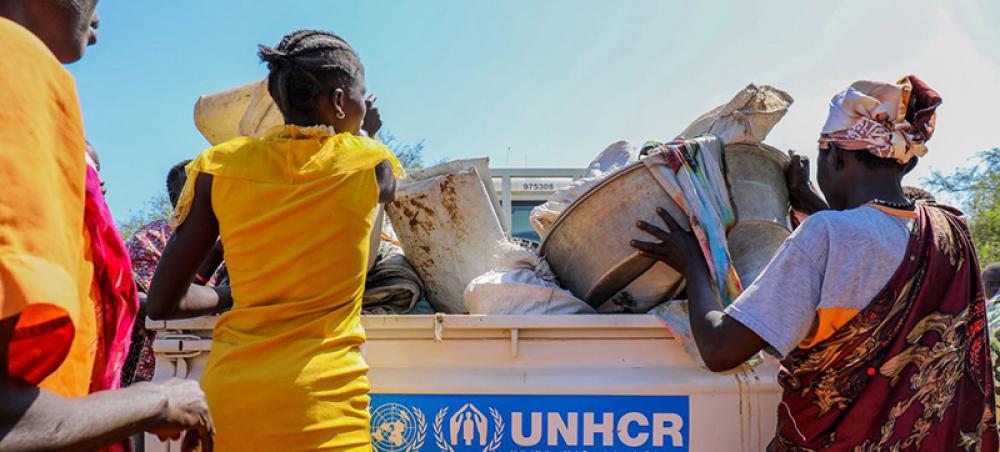Just Earth News | @justearthnews | 09 Dec 2022, 12:02 am Print
 South Sudan
South Sudan Image: © WFP/Anna Soper
New York: Throughout South Sudan’s Greater Upper Nile Region “desperation is rising” as escalating armed conflict, which has displaced at least 20,000 people since August, have forced some to run for their lives up to four times, the UN refugee agency, UNHCR, said on Wednesday.
“And more people are fleeing as conflict intensifies”, Arafat Jamal, UNHCR’s Representative in the world’s youngest country, said in a press release.
At least 3,000 people have already fled to neighbouring Sudan – further escalating South Sudan’s refugee crisis, which is already the largest in Africa. 
‘Civilians under attack’
“Civilians are under attack in this ruthless conflict; we must ensure their protection”, the UN official stressed.
Fighting erupted in the Upper Nile village of Tonga on 15 August. Violence has since spread further to northern parts of Jonglei and Unity states. 
And currently, conflict is spreading through Upper Nile’s Fashoda county, threatening the town of Kodok. 
Some in hiding
Women, children, and others at high risk, make up the majority of the displaced.
Some of those unable to flee, including older people, have been hiding in bushes during attacks, and along the White Nile River.
Fleeing civilians are visibly traumatized and report killings, injuries, gender-based violence, abductions, extortion, looting and the burning of property.
Many have lost their homes and been separated from their families.
Last month, Mr. Jamal led an inter-agency visit to the Adidiang island site, located about 40 kilometres south of the state capital, Malakal.
Under the protection of the UN Mission in South Sudan (UNMISS), the site was originally set up nearly 10 years ago to host up to 12,000 internally displaced.
Today, it accommodates some 37,000 souls – overcrowded even before the recent arrivals.
It was the UN’s first visit to the camp since an attack on 7 September, when some 4,000 civilians sheltering there were forced to flee to Malakal.
Survivors of the Adidiang attack reported that dozens were killed or wounded, while others drowned in the river when trying to escape.
‘Pattern of attacks’
On Sunday, UNHCR led another interagency mission to Diel in Jonglei. 
“In both Adidiang and Diel, we witnessed the aftermath of raw violence”, said Mr. Jamal.
“It was heartbreaking to see a clear pattern of attacks on civilians and their homes”.
In Diel, northern Jonglei, some of the displaced are returning to their burnt-out villages and homes. Some have been forced to eat wild water plants to survive.
Stepping up response
South Sudan has struggled to end violence between armed groups and military forces since a so-called Revitalized Peace Agreement brokered by regional bloc IGAD, between the President and his main rival, was inked in 2018. Implementation has been slow.
UNHCR, together with UN and NGO partners, has scaled up its response to provide life-saving support to the most vulnerable with shelter, relief items, protection services, cash, and other assistance.
Having now acquired river boats to improve mobility, UNHCR can currently reach people faster and more easily, including those in remote and hard-to-reach areas.
Downward spiral
Despite UNHCR’s support in de-escalating tensions and promoting peace, the situation continues to deteriorate. 
Armed conflict, localized violence, dramatic flooding, worsening food insecurity and economic destabilization, have left 6.8 million in need of urgent life-saving aid.
Tweet URL
As more people flee violence, needs are surging and UNHCR is scaling up its response amidst a severe funding shortfall.
By the end of November, just 46 per cent of the $214.8 million needed this year had been received.
‘Devastating’ impacts
At the same time, the UN Humanitarian Coordinator ad interim, Peter Van der Auweraert, noted that the humanitarian community in South Sudan is “appalled by the continuous violence that has a devastating impact on the lives and livelihoods of ordinary women, men and children”.
In Fashoda County, Upper Nile State, a recent surge in violence has displaced over 9,100 people.
The clashes that broke out in mid-November have also resulted in civilian deaths and injuries, the abduction of women and children, destruction of properties and livelihoods, as well as reported incidences of gender-based violence.
Working ‘around the clock’
Since the start of the crisis, over 2,300 people have arrived in the Malakal Protection of Civilians site – putting additional pressure on its already limited capacity.
Local responders pointed out that at least 75 per cent of the estimated 5,000 people displaced to Melut County from Manyo County are women and children, many of whom were separated from their caregivers.
“Humanitarian partners are working tirelessly, around the clock, on multiple frontlines to provide the newly displaced people with critical supplies and services,” said Mr. Van der Auweraert.
“Hostilities must cease immediately to reduce human suffering and prevent further loss of innocent lives”.
- Viral Irish food bank photo sparks shocking racist attacks on Indians
- Caught on camera: Two foreigners assaulted in Israel in an alleged racial attack
- Pakistan: Parents heartbroken after court sides with man accused of kidnapping minor Christian girl
- Pakistan: Trafficked 35 years ago, Bangladesh-born woman approaches court against FIA for offloading her from flight!
- Hindu tea worker found bound and bloodied in Bangladesh garden during general elections; investigation underway





-1763561110.jpg)
